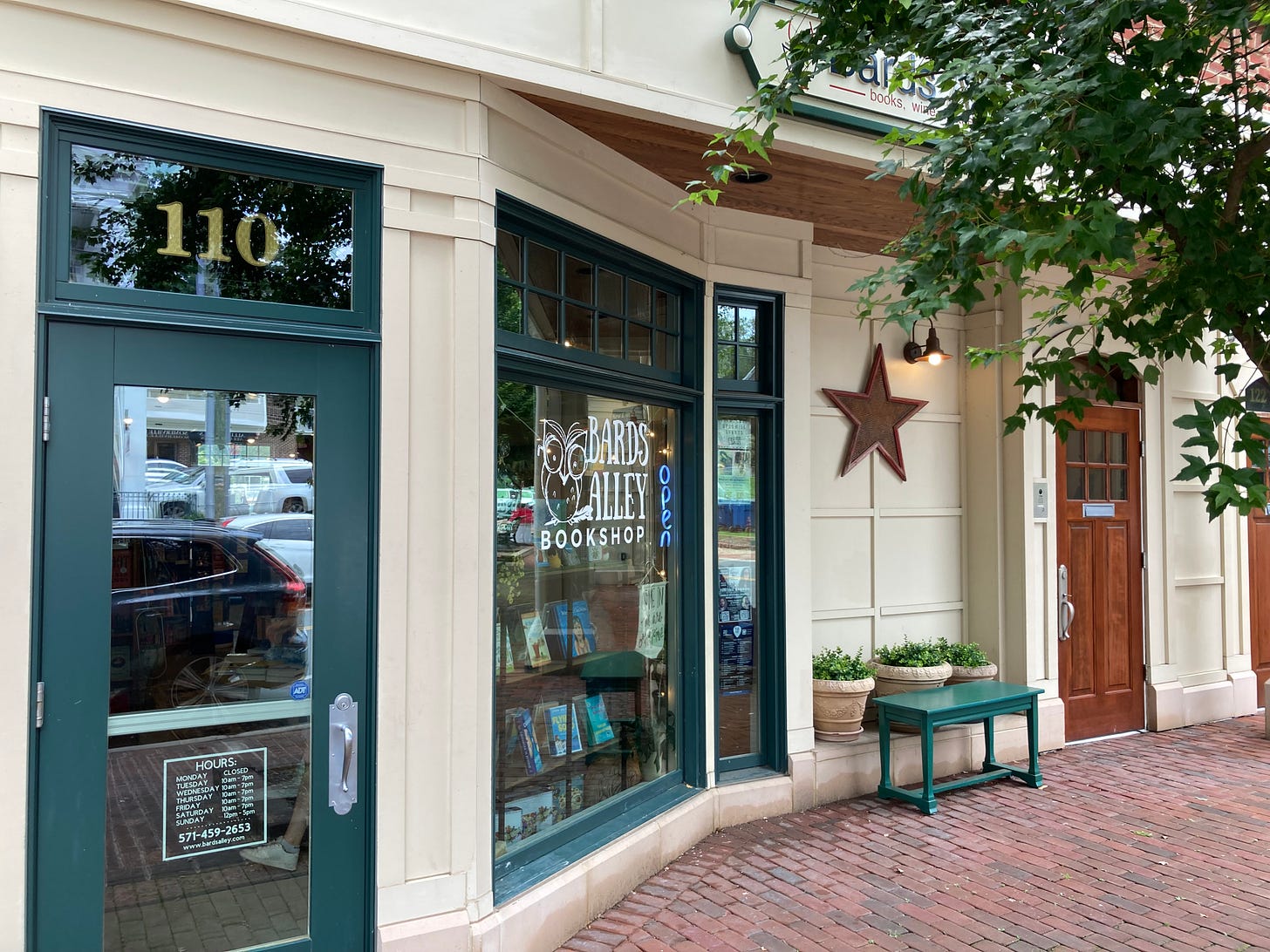D.C. Field Notes #1: The Bookstore and the Library
Into the surbubs of Rockville, MD and Vienna, VA for our bookstore visits
In our first introductory post, Rebecca referenced a fundamental question we had to answer: what makes a bookstore a bookstore?
I’d like to tackle another essential question dogging my mind, a question born not only from starting City Reads but from the moment I started buying books.
There was a definite moment, though its exact date escapes me. It happened sometime in high school, when, after years of going to the library with my family, I started to go alone, mostly to shop in the small library store where paperbacks were $.50 and hardbacks $1.
Why not continue to use the library exclusively? Why buy books?
There’s room for library fanaticism at City Reads, as well. My life is certainly better with libraries around. By sheer luck and civic planning, I’ve never lived more than a 10-minute drive from one. Right now, they’re a place of magic for my two-year-old, home to books and toys and other toddlers. I check out my share of books and films, including audiobooks through Libby, one of the library’s greatest successes in the digital age.
Libraries, while serving many functions, have the same core utility as a bookstore: to support a reading public and supply them with books.1 So what explains the urge to own books, not just borrow them?
If I were to be a little cynical about my own book buying (a healthy dose of which is probably advised for any line on the personal budget), I would have to admit that I buy books in order to signify something about myself: that I aspire to be well read, have good taste, or declare that I read at all, a rarer and rarer pastime.
That cynicism doesn’t encompass all that books mean to me, though. The act of reading is an uneven exchange between reader and book. For only a little bit of time and attention, a book grants invaluable gifts—perspective, truth, and beauty. The investment in this relationship almost merits that I own the book, that I keep it as a memento of new worlds and new ideas.
Owning books has other value. For parents, there’s the hope that one day your children will pull a book down from the family shelf and turn this love and exploration into a generational movement.
There’s the ability to lend a book to another, though, if we’re all honest, it happens less than we think it will. Our tastes are too peculiar; the people most prone to borrow often like to own for themselves; commonly, we’re too afraid to let one go lest it should come back in a lesser condition, or worse still, never come back at all.
Then there’s the idea that you yourself will return to your own collection for wisdom. This too may happen less than we’d like, but when it does, aren’t you so glad you had that book around?
I recall weighing a job offer that would take me across the country, and unable to sleep, proceeded to open East of Eden and reread the discovery of the word “Timshel” and the divine promise in Genesis that “thou mayest choose for thyself”. Or a few months later, after accepting the job and moving, rereading on multiple occasions the opening paragraphs of the New York section of Willie Morris’s North Toward Home where he cautions the new urbanite not to let go of those things most important to him.
Where does this leave me? Reminded once again that book lovers are a dying breed. Who can protest our wanting to keep the relics of our fictional sojourns nearby? Some books I’ll check out from the library. Others I’ll purchase used, fewer new. I’m glad to have them all.
Bookstores
Friends of the Library Bookstore - Rockville, Maryland
I take it as a good omen when I see a large photo of Frog and Toad plastered on the front window of a bookstore… read more
Bard’s Alley Bookstore - Vienna, Virginia
Perhaps because of all the names, Bard’s Alley, Vienna, Church Street, the experience of going to this little store is faintly European. It helps that there’s a clock shop across the road with scallop shingles and gargoyles that on closer inspection turn out to be cartoon-like dragons… read more
Libraries and bookstores share one additional attribute. Decline. For libraries, “usage” is the biggest measurement of decline. According to one study, from 2010-2018, usage of public libraries declined 31%. For bookstores, decline is measured in sales and closures. Bookstore sales have dropped from a peak of 16.8 billion in 2007 to 10.0 billion in 2017. The number of bookstores has been cut in half since the late 1990s.
I don’t mean to be doom and gloom. The love of books, bookstores, and libraries has never been contingent on this being a popular pastime. However, it does add to the mystery of why some of us still make reading such a part of our lives, and leaves the question unanswered as to why we’re compelled to buy books.






